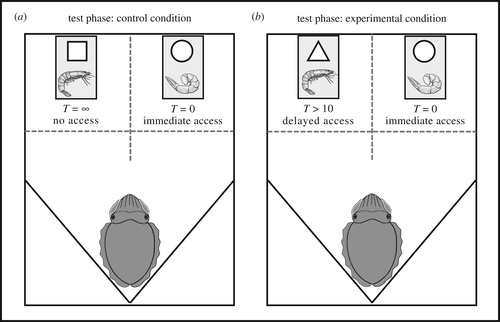Again in 2021, a check of cephalopod smarts strengthened how essential it’s for us people to not underestimate animal intelligence.
Cuttlefish got a brand new model of the marshmallow check, and the outcomes could reveal that there is extra happening of their unusual little brains than we knew.
Their skill to be taught and adapt, the researchers mentioned, may have developed to present cuttlefish an edge within the cutthroat eat-or-be-eaten marine world they stay in.
The marshmallow check, or Stanford marshmallow experiment, is fairly easy.
A toddler is positioned in a room with a marshmallow. They’re advised if they’ll handle to not eat the marshmallow for quarter-hour, they will get a second marshmallow, and be allowed to eat each.
This skill to delay gratification demonstrates cognitive talents comparable to future planning, and it was initially carried out to check how human cognition develops; particularly, at what age a human is sensible sufficient to delay gratification if it means a greater final result later.
As a result of it is so easy, it may be adjusted for animals. Clearly you’ll be able to’t inform an animal they will get a greater reward in the event that they wait, however you’ll be able to practice them to know that higher meals is coming if they do not eat the meals in entrance of them right away.
Some primates can delay gratification, together with canines, albeit inconsistently. Corvids, too, have handed the marshmallow check.
In 2020, cuttlefish additionally handed a model of the marshmallow check. Scientists confirmed that widespread cuttlefish (Sepia officinalis) can chorus from consuming a meal of crab meat within the morning as soon as they’ve learnt dinner will probably be one thing they like a lot better – shrimp.
Nevertheless, as a crew of researchers led by behavioral ecologist Alexandra Schnell of the College of Cambridge identified, on this case it was troublesome to find out whether or not this variation in foraging conduct in response to prey availability was additionally being ruled by a capability to exert self-control.
So that they designed one other check, for six widespread cuttlefish. The cuttlefish had been positioned in a particular tank with two enclosed chambers that had clear doorways so the animals may see inside. Within the chambers had been snacks – a less-preferred piece of uncooked king prawn in a single, and a way more attractive stay grass shrimp within the different.

The doorways additionally had symbols on them that the cuttlefish had been skilled to recognise. A circle meant the door would open right away. A triangle meant the door would open after a time interval between 10 and 130 seconds. And a sq., used solely within the management situation, meant the door stayed closed indefinitely.
Within the check situation, the prawn was positioned behind the open door, whereas the stay shrimp was solely accessible after a delay. If the cuttlefish went for the prawn, the shrimp was instantly eliminated.
In the meantime, within the management group, the shrimp remained inaccessible behind the square-symbol door that would not open.
The researchers discovered that all the cuttlefish within the check situation determined to attend for his or her most popular meals (the stay shrimp), however did not hassle to take action within the management group, the place they could not entry it.
“Cuttlefish in the present study were all able to wait for the better reward and tolerated delays for up to 50-130 seconds, which is comparable to what we see in large-brained vertebrates such as chimpanzees, crows, and parrots,” Schnell mentioned again in 2021.
The opposite a part of the experiment was to check how good the six cuttlefish had been at studying. They had been proven two totally different visible cues, a gray sq. and a white one.
After they approached one, the opposite could be faraway from the tank; in the event that they made the “correct” alternative, they’d be rewarded with a snack.
As soon as they’d learnt to affiliate a sq. with a reward, the researchers switched the cues, in order that the opposite sq. now turned the reward cue.
Curiously, the cuttlefish that learnt to adapt to this variation the quickest had been additionally the cuttlefish that had been capable of wait longer for the shrimp reward.
That looks like cuttlefish can exert self-control, all proper, however what’s not clear is why.
In species comparable to parrots, primates, and corvids, delayed gratification has been linked to elements comparable to software use (as a result of it requires planning forward), meals caching (for apparent causes) and social competence (as a result of prosocial conduct – comparable to ensuring everybody has meals – advantages social species).
Cuttlefish, so far as we all know, do not use instruments or cache meals, nor are they particularly social. The researchers assume this skill to delay gratification could as an alternative have one thing to do with the way in which cuttlefish forage for his or her meals.
“Cuttlefish spend most of their time camouflaging, sitting and waiting, punctuated by brief periods of foraging,” Schnell mentioned on the time.
“They break camouflage when they forage, so they are exposed to every predator in the ocean that wants to eat them. We speculate that delayed gratification may have evolved as a byproduct of this, so the cuttlefish can optimize foraging by waiting to choose better quality food.”
It is an enchanting instance of how very totally different life in very totally different species may end up in comparable behaviors and cognitive talents.
Proof of “episodic-like reminiscence” has been present in cuttlefish, and in 2024 scientists reported the primary remark of the creature forming false reminiscences.
Future analysis ought to, the crew famous, attempt to decide if certainly cuttlefish are able to planning for the longer term.
The crew’s analysis was printed in Proceedings of the Royal Society B.
A model of this text was first printed in March 2021.

